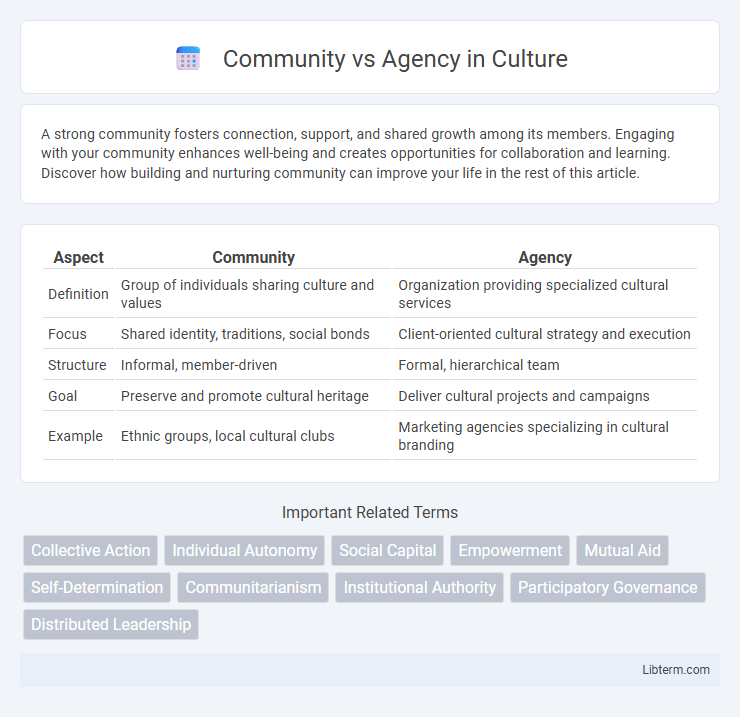A strong community fosters connection, support, and shared growth among its members. Engaging with your community enhances well-being and creates opportunities for collaboration and learning. Discover how building and nurturing community can improve your life in the rest of this article.
Table of Comparison
| Aspect | Community | Agency |
|---|---|---|
| Definition | Group of individuals sharing culture and values | Organization providing specialized cultural services |
| Focus | Shared identity, traditions, social bonds | Client-oriented cultural strategy and execution |
| Structure | Informal, member-driven | Formal, hierarchical team |
| Goal | Preserve and promote cultural heritage | Deliver cultural projects and campaigns |
| Example | Ethnic groups, local cultural clubs | Marketing agencies specializing in cultural branding |
Understanding Community and Agency
Community refers to a group of individuals connected by shared interests, values, or geographic location, fostering a sense of belonging and mutual support. Agency denotes the capacity of individuals or groups to make independent choices and enact change within their environment. Understanding the interplay between community and agency highlights how collective identity shapes personal empowerment and decision-making processes.
Defining Key Differences
Community emphasizes shared values, collective goals, and local engagement, often driven by collaboration and mutual support. Agency centers on individual autonomy, personal responsibility, and the capacity to make independent choices and take intentional actions. These distinctions highlight community's focus on interconnectedness versus agency's emphasis on self-determination and control over one's environment.
Community: Strengths and Limitations
Community offers a strong sense of belonging and collective support, fostering collaboration and shared resources that empower members. It enables grassroots initiatives and social cohesion, contributing to sustained local development and resilience. However, communities may face limitations such as internal conflicts, limited access to external resources, and slower decision-making processes compared to centralized agencies.
Agency: Strengths and Limitations
Agencies excel in delivering specialized expertise, scalable resources, and structured project management, making them ideal for complex campaigns requiring diverse skills and rapid execution. Their limitations include higher costs, potential lack of deep brand immersion, and less flexibility in adapting to evolving community dynamics compared to grassroots community-led initiatives. Leveraging agency strengths while mitigating these constraints can optimize marketing outcomes through strategic collaboration and clear communication.
Collaboration Models Between Communities and Agencies
Collaboration models between communities and agencies often emphasize co-creation, shared decision-making, and resource exchange to enhance social impact and local development. Community-based participatory approaches integrate local knowledge with agency expertise, fostering trust and ensuring culturally relevant solutions. Hybrid models balance agency-driven structure with community-led initiatives, maximizing efficiency and sustainable outcomes.
Impact on Decision-Making Processes
Community involvement enhances decision-making processes by incorporating diverse perspectives and fostering collective ownership, leading to more inclusive and sustainable outcomes. In contrast, agency-led decisions often rely on specialized expertise and structured protocols, enabling faster implementation but potentially limiting stakeholder input. Balancing community engagement with agency authority can optimize decision quality and legitimacy in policy development and project execution.
Cost and Resource Considerations
Community-driven projects typically require lower upfront costs by leveraging volunteer time and shared resources, making them ideal for budget-conscious initiatives. Agencies often involve higher expenses due to professional fees, specialized expertise, and dedicated project management, but provide structured support and efficiency. Resource allocation in communities is more flexible and variable, while agencies ensure consistent availability and scalability for complex or ongoing projects.
Case Studies: Real-World Comparisons
Case studies comparing community-led initiatives with agency-driven projects reveal differences in engagement outcomes and cost efficiency. Community models often demonstrate higher local participation rates and sustainable impact due to grassroots involvement, while agency-led efforts benefit from structured expertise and scalability. Metrics from multiple case studies highlight that hybrid approaches can leverage the strengths of both, optimizing resource allocation and stakeholder satisfaction.
Choosing the Right Fit for Your Needs
Choosing between a community and an agency depends on your specific needs, budget, and desired level of support. Communities offer collaborative environments with peer-driven insights, ideal for those seeking shared experiences and flexible resources. Agencies provide specialized expertise, personalized strategies, and direct management, making them suitable for businesses requiring targeted professional services and accountability.
Future Trends: Community and Agency Evolution
Community and agency models are evolving rapidly, driven by digital transformation and increasing demand for personalized interaction. Future trends highlight the integration of AI and data analytics to enhance community engagement and optimize agency services, resulting in more dynamic, scalable, and responsive ecosystems. Hybrid models combining community-driven insights with agency expertise are poised to dominate, fostering innovation and strategic alignment in marketing and customer relations.
Community Infographic

 libterm.com
libterm.com